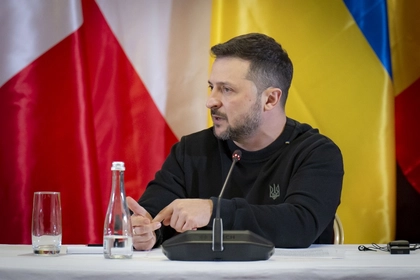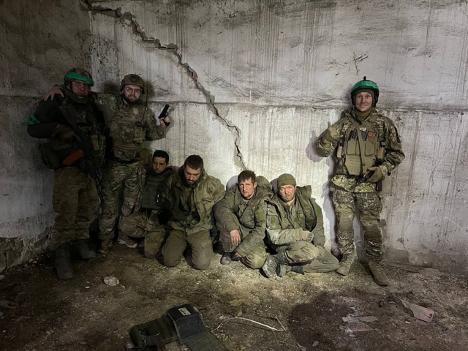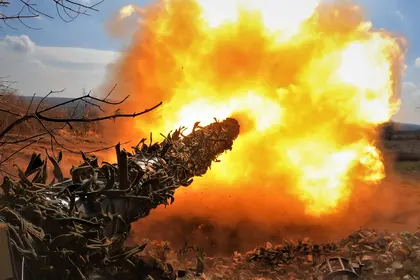A fierce Ukrainian counterattack in the Bakhmut sector destroyed Russian tanks and infantry fighting vehicles, killing as many as 500 soldiers from the Wagner mercenary group, in the worst tactical defeat suffered by the Kremlin’s forces in months.
In tough, close-in fighting, soldiers from Ukraine’s 3rd Assault Brigade, backed by T-64 tanks and M-113 armored personnel carriers, wiped out a chain of Russian defensive positions to the southwest of Bakhmut, advancing Ukrainian-controlled territory to the key Bakhmutovka River, according to statements from the Wagner group’s commander Yevgeny Prigozhin and Ukrainian military sources.
Prigozhin, in an angry Tuesday evening video address, accused the 72nd Motor Rifle Brigade, a regular Russian army infantry unit holding positions in the area, of abandoning fortifications, thereby allowing attacking Ukrainian units to outflank his group’s positions. Wagner lost “500 men,” Prigozhin claimed, as a result of a powerful Ukrainian assault and the men of the 72nd’s unwillingness to fight to hold their ground.
In a single day’s fighting on Tuesday, Russian forces in the Bakhmut sector were forced to abandon a battle space two kilometers deep and six kilometers long, Prigozhin said. If confirmed it would be the most significant turnover of military real estate in six months of battles in Bakhmut, where the Russian military has struggled to advance more than a few dozen meters in a typical fighting day.

Zelensky Criticizes G20’s Weak Position on Russian Invasion
Multiple sources linked with 3rd Assault Brigade – a former territorial defense unit raised in Kyiv from elements of the Azov Regiment in the early days of the war and now a veteran Armed Forces of Ukraine (AFU) attack unit – confirmed most details of Prigozhin’s claims.
Drone video published by Azov’s media section showed well-equipped troopers aboard US-made, Vietnam-era M-113 armored personnel carriers charging up to flattened Russian defensive positions, debarking, and executing textbook fire-and-movement assaults backed by automatic weapons fire and hand grenades. One unit spokesmen claimed two companies from 72nd Infantry – usually between 200-300 men – were wiped out.
Multiple sources said the 3rd Assault Brigade’s attack captured combat vehicles and prisoners. According to a unit statement at least 64 Russian soldiers died in the assault but casualty counts were not complete. Azov Battalion founder Andriy Biletsky said the amount of Russian equipment and soldiers taken into custody by the Ukrainians was “significant.”
AFU tanks were shown firing on Russian positions at point blank range, and infantrymen from the 3rd Assault Brigade moving through Russian positions past corpses. Some individual soldier posts showed corpses with identification and name tags linking the body to a Russian paratrooper unit. The 3rd Assault Brigade is a veteran formation with long experience on the front line.
On Wednesday evening, Commander of Ukrainian ground forces Oleksandr Syrskyi also said Russian troops had fallen back in some regions of the front in the eastern Donetsk region by up to two kilometres (around one mile).
"We are seeing the results of the effective actions of our units," Syrskyi said, explaining that his forces were launching counter attacks along some portions of the contact line around Bakhmut.
"In some areas of the front, the enemy could not withstand the onslaught of Ukrainian defenders and retreated to a distance of up to two kilometres," he added.
Kremlin military leadership in November declared Bakhmut a critical intermediate objective for its then still-functioning plan to take over Ukraine’s Donetsk region and annex it.
In the following months a carousel of AFU units has rotated in and out of Bakhmut to contest Russian attacks in bitter, often house-to-house fighting. Ukrainian military social media has identified, along with the 3rd Assault, elements of the AFU’s 5th Assault, 92nd Mechanized, Presidential Guards, 79th and 80th Airborne Assault Brigades, as well as detachments from the Kharkiv region territorial defense battalions, all holding portions of the Bakhmut perimeter.
White House national security spokesperson John Kirby on May 1 told reporters the US estimates Russia has lost as many as 100,000 men in largely failed attacks in the past five months, the lion’s share of them suffered by the Wagner mercenary group in Bakhmut.
The AFU’s counterattack at Bakhmut was likely the most decisive Ukrainian battlefield success since late January and early February, when a pair of Russian Marine brigades, heavily reinforced with tanks, attacked positions held by the AFU’s 72nd Mechanized Infantry Brigade in the city of Vuhledar. The Russian forces hit dense minefields and were gutted by concentrated artillery strikes.

Image of Russian prisoners captured by 3rd Assault Brigade at Bakhmut. Source: Gruz 200 Telegram channel
You can also highlight the text and press Ctrl + Enter






